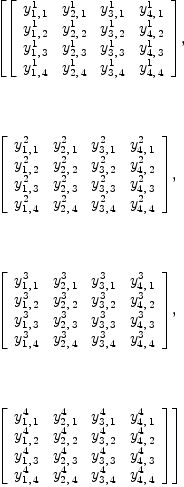|
|
|
last edited 14 years ago by Bill Page |
Edit detail for SandBox Grassmann Algebra Is Frobenius In Many Ways revision 3 of 8
| 1 2 3 4 5 6 7 8 | ||
|
Editor: Bill Page
Time: 2011/04/05 14:25:04 GMT-7 |
||
| Note: AntiSymm | ||
added:
Generate structure constants for Grassmann Algebra
\begin{axiom}
-- Construct a basis for the Grassmann algebra
GA:=AntiSymm(INT,[subscript(g,[i]) for i in 1..n])
B:=[exp(reverse concat([0 for i in 1..n-length(x)],wholeRagits(x::RADIX(2))))$GA for x in 0..dim-1]
-- Compute the multiplication table
M:=matrix [[B.i * B.j for j in 1..dim] for i in 1..dim]
-- The structure constants of the algebra are given by the coefficients
-- of the polynomials in the multiplication table with respect to the basis
S(y)==map(x+->coefficient(x,y),M)
Yg:T:=unravel concat concat(map(S,B)::List List List FRAC POLY INT)
\end{axiom}
![]() -dimensional vector space representing Grassmann algebra with
-dimensional vector space representing Grassmann algebra with ![]() generators
generators
An algebra is represented by a (2,1)-tensor
![]() viewed as a linear operator with two inputs
viewed as a linear operator with two inputs ![]() and one
output
and one
output ![]() . For example:
. For example:
n:=2
| (1) |
dim:=2^n
| (2) |
T:=CartesianTensor(1,dim, FRAC POLY INT)
| (3) |
Y:T := unravel(concat concat [[[script(y,[[i, j], [k]]) for i in 1..dim] for j in 1..dim] for k in 1..dim] )
 | (4) |
Generate structure constants for Grassmann Algebra
-- Construct a basis for the Grassmann algebra GA:=AntiSymm(INT,[subscript(g, [i]) for i in 1..n])
| (5) |
B:=[exp(reverse concat([0 for i in 1..n-length(x)],wholeRagits(x::RADIX(2))))$GA for x in 0..dim-1]
| (6) |
-- Compute the multiplication table M:=matrix [[B.i * B.j for j in 1..dim] for i in 1..dim]
 | (7) |
-- The structure constants of the algebra are given by the coefficients -- of the polynomials in the multiplication table with respect to the basis S(y)==map(x+->coefficient(x,y), M)
Yg:T:=unravel concat concat(map(S,B)::List List List FRAC POLY INT)
Compiling function S with type AntiSymm(Integer,[*01g1, *01g2]) -> Matrix(Integer)
 | (8) |
A scalar product is denoted by the (2,0)-tensor
![]()
U:T := unravel(concat [[script(u,[[], [j, i]]) for i in 1..dim] for j in 1..dim] )
 | (9) |
Definition 1
We say that the scalar product is associative if the tensor equation holds:
Y = Y
U U
In other words, if the (3,0)-tensor:
i j k i j k i j k
\ | / \/ / \ \/
\|/ = \ / - \ /
0 0 0
| (10) |
YU := reindex(reindex(U,[2, 1])*reindex(Y, [1, 3, 2]), [3, 2, 1])-U*Y;
Definition 2
An algebra with a non-degenerate associative scalar product is called pre-Frobenius.
We may consider the problem where multiplication Y is given,
and look for all associative scalar products ![]() or we
may consider an scalar product U as given, and look for all
algebras
or we
may consider an scalar product U as given, and look for all
algebras ![]() such that the scalar product is associative.
such that the scalar product is associative.
This problem can be solved using linear algebra.
)expose MCALCFN
MultiVariableCalculusFunctions is now explicitly exposed in frame initial K := jacobian(ravel(YU),concat(map(variables, ravel(Y)))::List Symbol);
The matrix K transforms the coefficients of the tensor ![]() into coefficients of the tensor
into coefficients of the tensor ![]() . We are looking for
coefficients of the tensor
. We are looking for
coefficients of the tensor ![]() such that
such that K transforms the
tensor ![]() into
into ![]() for any
for any ![]() .
.
A necessary condition for the equation to have a non-trivial
solution is that the matrix K be degenerate.
Consider the determinant of the matrix K above:
\begin{axiom}
Kd := factor(determinant(K)::DMP(concat map(variables,ravel(U)),FRAC INT))
\end{axiom}
The scalar product must also be non-degenerate:
\begin{axiom}
Ud:DMP(concat map(variables,ravel(U)),FRAC INT) := determinant [[U[i,j] for j in 1..dim] for i in 1..dim]
\end{axiom}
The basis of the null space of the K matrix:
\begin{axiom}
YUS:T := reindex(reindex(US,[2,1])*reindex(Y,[1,3,2]),[3,2,1])-US*Y
KS := jacobian(ravel(YUS),concat(map(variables,ravel(Y)))::List Symbol);
NS:=nullSpace(KS)
SS:=map((x,y)+->x=y,concat map(variables,ravel Y),
entries reduce(+,[p[i]*NS.i for i in 1..#NS]))
YS:T := unravel(map(x+->subst(x,SS),ravel Y))
\end{axiom}
This defines a family of pre-Frobenius algebras:
\begin{axiom}
test(unravel(map(x+->subst(x,SS),ravel YUS))$T=0*YU)
\end{axiom}
Alternatively we may consider
J := jacobian(ravel(YU),concat(map(variables, ravel(U)))::List Symbol);
The matrix J transforms the coefficients of the tensor ![]() into coefficients of the tensor
into coefficients of the tensor ![]() . We are looking for
coefficients of the tensor
. We are looking for
coefficients of the tensor ![]() such that
such that J transforms the
tensor ![]() into
into ![]() for any
for any ![]() .
.
A necessary condition for the equation to have a non-trivial
solution is that all 70 of the 4x4 sub-matrices of J are
degenerate. To this end we can form the polynomial ideal of
the determinants of these sub-matrices:
\begin{axiom}
JP:=ideal concat concat concat
[[[[ determinant(
matrix([row(J,i1),row(J,i2),row(J,i3),row(J,i4)]))
for i4 in (i3+1)..maxRowIndex(J) ]
for i3 in (i2+1)..(maxRowIndex(J)-1) ]
for i2 in (i1+1)..(maxRowIndex(J)-2) ]
for i1 in minRowIndex(J)..(maxRowIndex(J)-3) ];
#generators(%)
\end{axiom}